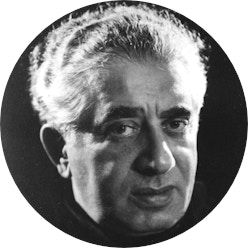
Aram Khachaturian
June 6, 1903 - Tbilisi (Georgia) — May 1, 1978 - Moscow (Russia)
About
Khachaturian was an autodidact cradled in Caucasian folklore until he was nineteen. In 1922, he studied the cello and composition at the Gnessin School of Music followed by the Moscow Conservatory with Miaskovsky and Vassilenko. Born into a family where art was primordial, Aram’s brothers also led successful artistic careers, one as a singer and the other as stage director.
Impassioned by his late studies, Khachaturian made up for lost time and turned his attention to the scores of the great masters. From Bach to Shostakovich, German Romanticism to French impressionism, the young composer steeped himself in all the different tendencies, which gave his work an air of heterogeneity. His Piano Concerto (1936), one of his most famous works, bears witness to this taste for several styles. It was with this work that Khachaturian’s success began. He was then to take on Armenian cultural heritage with an aim to forge his own style.
The composer did not try to be novel in his work but offered pages of striking vitality thanks to a rhythmic energy based on repetition and his coloured and sometimes massive orchestration. Naturally inquisitive, Khachaturian composed the music for the ballet Gayane in 1942 and delivered one of his most famous scores, the Sabre Dance. Between formalism and conventionalism, the compositor did however leave some works behind, particularly in his film music, which are undeniably slushy.

